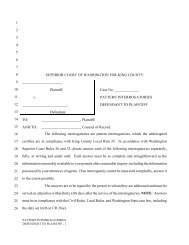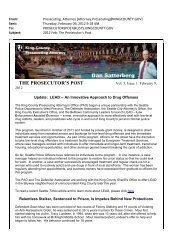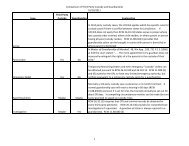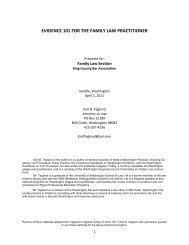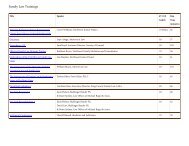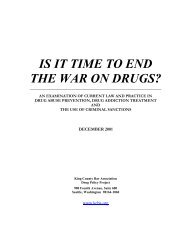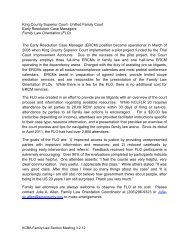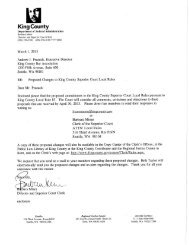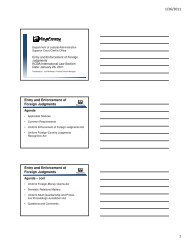Effective Drug Control: Toward A New Legal Framework
Effective Drug Control: Toward A New Legal Framework
Effective Drug Control: Toward A New Legal Framework
Create successful ePaper yourself
Turn your PDF publications into a flip-book with our unique Google optimized e-Paper software.
II. INTERNATIONAL TRENDS IN DRUG POLICY:<br />
LESSONS LEARNED FROM ABROAD<br />
Nations across the world face the continual challenge of drug abuse and drugrelated<br />
crime within their own borders and, like the United States, they struggle with the<br />
costly ineffectiveness of their current drug policies. Just as many American states are<br />
beginning to depart from the harshly punitive approach through innovations such as drug<br />
courts, several nations, particularly in Europe, have devised methods under the rubric of<br />
“harm reduction” that have been shown to address the problem of drug addiction more<br />
effectively than strict criminal law enforcement. Meanwhile, in other regions of the<br />
world, particularly in Asia, states have been turning to ever harsher measures, including<br />
summary executions, but with no success in reducing drug use or its attendant harms.<br />
The following survey of the most recent international trends in drug policy should<br />
provide useful guidance in the effort to improve drug policies in the United States:<br />
INTERNATIONAL LEGAL FRAMEWORK<br />
The current drug control regime is global in scope, under a series of international<br />
conventions adopted by United Nations member nations. 201 Most nations are signatories<br />
to those treaties, which prohibit the use and sale of the same drugs that are prohibited in<br />
the United States. 202 The U.N. conventions are part of the large body of international law<br />
that is not “enforceable” in the traditional sense, but signatories to the drug control<br />
treaties are subject to enormous diplomatic pressure, particularly from the United States,<br />
not to enact national laws that depart from the prohibition framework. 203 The<br />
International Narcotics <strong>Control</strong> Board (INCB), an independent body within the United<br />
Nations, serves more as a panel to monitor adherence to the U.N. conventions rather than<br />
as an enforcement agency, but it often voices support for or objection to drug policy<br />
developments around the world, consistent with prevailing U.S. domestic and foreign<br />
drug policy interests. 204<br />
Within the framework of international drug prohibition, a number of countries,<br />
especially in Europe, now employ less punitive measures to address drug use and<br />
dependence without endangering their international legal or diplomatic standing – despite<br />
occasional public scolding from the United Nations. 205 Within the European Union,<br />
however, fundamental opposition to prohibitionist drug policies has begun to surface<br />
among parliamentarians. In 2003 a group of 108 members of European parliaments from<br />
seven political groups and 13 European Union member states recommended reform of the<br />
United Nations drug control conventions, denouncing prohibitionist policy as the cause of<br />
harm “because it is an obstacle to prevention, only leads to blind repression and causes<br />
rising profits to organized crime.” 206 Among European leaders there is certainly no<br />
consensus about the wisest approach to drug policy, but there is a desire to reconcile<br />
differing views on the matter. Greek Prime Minister George Papandreou, the European<br />
Union President in 2003, called for an open and frank discussion of international drug<br />
laws to deal with the disparate nature of its members' treatment of the subject. 207



